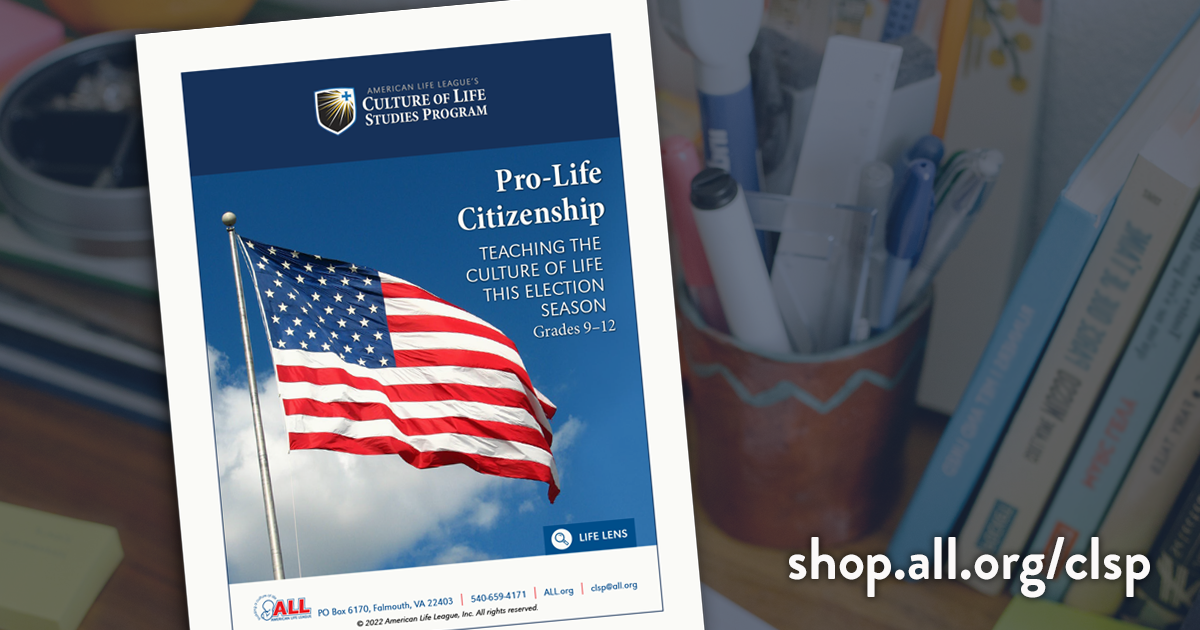By Susan Ciancio
Evangelium Vitae, or The Gospel of Life, is St. John Paul II’s encyclical on the sanctity of all human life. Written in 1995, this beautiful and loving encyclical addresses our relationship with God, how to build a culture of life, and the importance of seeing dignity in every person — born or preborn, old or young, sick or healthy. The predominant message of this work is to teach the Church family to care for and love our neighbors by valuing and protecting them from creation until death.
As the Holy Father points out, we cannot build a culture of life if we do not respect each and every person and then live out that respect in all that we do. It is our duty — not only to our fellow man, but to our children and God — to live our lives in such a way that we affirm the dignity of all people. In addition, we must teach the next generation to do so as well — through both our words and our actions.
What does this look like in real life?
We must teach the difference between the culture of life and the culture of death.
Our secular society is saturated with messages on social media, on TV, and in print that encourage people — especially impressionable kids — to do what “feels good” and to put themselves before others. While there may also be messages to stand up for themselves, no one is teaching our kids to stand up for God and His truths — except you. When we help our children understand and really see the motives behind the proponents of the culture of death and teach them how to combat this culture by following Christ’s teachings, we will restore a culture that affirms all life.
We must teach the virtue of solidarity and how it’s essential to building a culture of life.
Solidarity involves treating others — everyone — as part of the human family because we are all children of God and made in His likeness. To that end, we welcome strangers, we help those in need, and we treat people like we want to be treated. In essence, we live out the Corporal Works of Mercy each and every day of our lives, and we teach our children to do so as well.
We must teach the redemptive value of suffering.
Euthanasia and assisted suicide are scourges upon our society that teach people that those who are sick, elderly, or suffering are burdens and should have the “choice” to take their own lives. Our society doesn’t teach that every single person is valuable and wanted or that every single person matters. Further, it doesn’t explain that suffering unites us to Christ and draws us closer to Him. As Catholics, we believe in the redemptive value of suffering — that our suffering here on earth will benefit us later in life or will help someone else if we offer it up for him.
We must teach that there is a connection between contraception and abortion.
The family is the cornerstone of society. With the introduction and widespread use of contraception comes an increase in people having multiple sexual partners, the objectification of women, the commodification of babies, and an increase in abortion. As a result, families suffer. And when families break down, so does society.
We must teach that abortion is always wrong.
Abortion is a difficult and contentious topic to discuss with children, and it’s something you should approach differently depending on their ages. But regardless of how much information we give, it is our duty to teach our kids at every age the humanity and dignity of preborn babies and to explain why we must protect the most vulnerable among us.
Teaching the Gospel of Life, and living a culture of life, is our responsibility and our duty to our families. Children pick up what they see, hear, and read — and they know and hear more than we think they do. If we don’t combat any lies or half-truths that they encounter, they will grow up believing those lies. Our children need our guidance to help them navigate this secular world. That is the only way to help spread the Gospel of Life that St. John Paul II so eloquently taught.
The Culture of Life Studies Program, working in conjunction with Vocare, has developed a 4-lesson course on Evangelium Vitae for parents, educators, and anyone who wants to learn how to not only build, but strengthen, the Gospel of Life in their community or home. Visit the My Catholic Faith Delivered site for more information.


